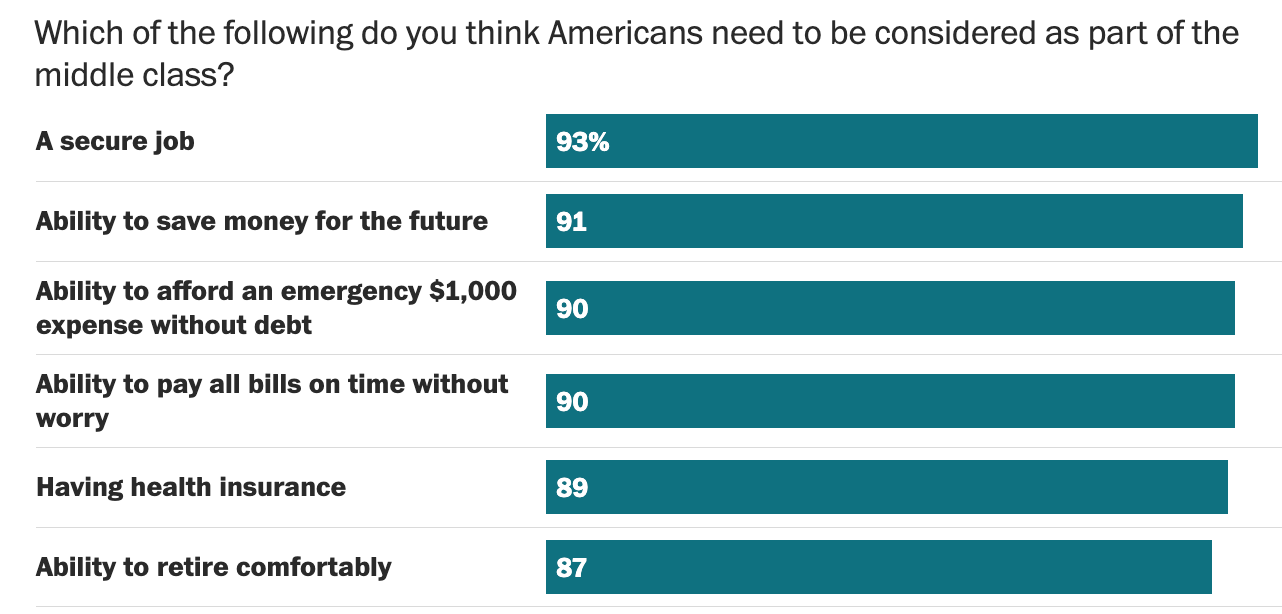“Underlying the nation’s problem with economic opportunity is the nation’s problem with educational opportunity.” (Haskins and Sawhill)
The Brookings Institution revived the “Success Sequence” in their 2009 publication, “Creating an Opportunity Society.”
The Success Sequence, or, “The three norms,” are 1. Graduate high school, 2. Get a full-time job, and 3. Get married before having children. If you follow this road map, you’re supposed to have a much higher chance of “entering or staying in the middle class.”
I’m going point by point down the list to see if this advice checks out, especially in the year of our lord 2024.
First things first…
What’s the middle class?
Pew Research Center’s class calculator said in 2020 that 52% of Americans were middle class.
According to the Washington Post, more recently in 2024, middle class is measured by three factors, and an income can be considered middle class if it meets all three criteria.
Is close to the median income for an area
Is within the middle 60% of incomes in an area
How far away an income is from the poverty level
You can check out their methodology here.
It’s also tied to the number of people in a household. “For instance, an income of $57,000 would be middle class for a three-person household in Ann Arbor, Mich., but might be too low for four people in Anchorage.”
It’s not just about money; the Washington Post surveyed 1,280 Americans from various demographics in English, and Spanish in November, 2023 on what it means to be middle class. Six topics came out as the top criteria for being in America’s middle class, and those were:

According to this criteria, only 35% of all Americans qualify as “middle class.”
This leads us to the question- does graduating from high school reliably mean you’ll enter or stay in the middle class?
How have high school graduation rates changed over time?
So you’d assume that worsening conditions for the middle class would be associated with declining high school graduation rates. Assuming makes an ass out of you and me, because that’s incorrect.
From 1980-2020, the Four-Year Adjusted Cohort Graduation Rate (ACGR) increased for all races to an all time high of 86.5%. Rates have dropped (anecdotally) to around 80-83%, but this is still higher than 79% in 2009, when Brookings introduced this idea.
So rates of high school graduation, keeping in mind that the ACGR doesn’t include GEDs, have climbed. Income inequality- namely, shares of the economy the middle class gets, have shrunk.
With this in mind, does graduating high school even improve your likelihood of making it to the middle class?
High School Graduation and Chances of Joining the Middle Class
According to the National Center for Education Statistics, in 2021, a householder between the ages of 25-34 with a high school diploma but no college degree made on average $39,700. For a householder without a high school diploma, that number falls to $32,500. For a family of 4 in 2024, this is just at the national poverty line for the country, but varies by region.
In short, graduating high school is correlated with being at or slightly above the poverty line. According to the Washington Post’s measure of middle-class-
Is close to the median income for an area
Is within the middle 60% of incomes in an area
How far away an income is from the poverty level
Graduating high school does not guarantee entry to the middle class. Womp womp.
End Takeaway
Fun fact that I didn’t catch until now- Sawhill and Haskin’s study on the Success Sequence excludes families with elderly people, family with disabled individuals, and families where all members (including the head of household) are under the age of 25.
So basically, if you want to be middle class, don’t take care of your elders, don’t take care of your disabled family members, and for the love of Christ, don’t have children before age 25. A society is measured by how they take care of their most vulnerable, and in the Success Sequence, the wisdom is to say, “fuck ‘em.”
Going back to graduation; graduating high school can give you a leg up when it comes to “joining the middle class.” This means that a high school diploma helps you compete against your peers for an ever-shrinking piece of the middle-class pie. If being middle class entails cutthroat competition, not caring for your family, and not having children, why are we doing this?
Are we asking the right questions? Shouldn’t we be removing barriers to middle-class entry, not just coaching people on how to game the system the best if they fit a very specific criteria, i.e. not caring for an elderly or disabled family member, or are a young parent?
It’s almost like the Success Sequence is a series of values that our culture approves of instead of an actual roadmap to success, and has little bearing in reality for 2024. Next week we’ll talk about “Get a full time job,” but as of now, I’m unconvinced!








